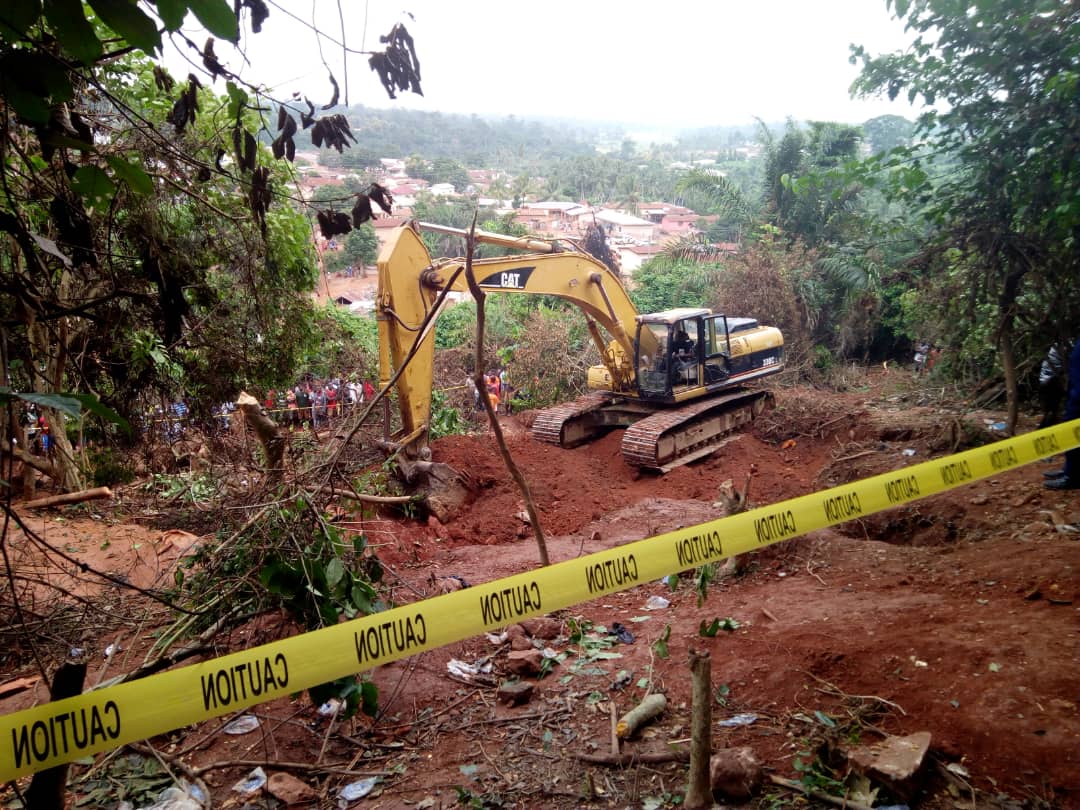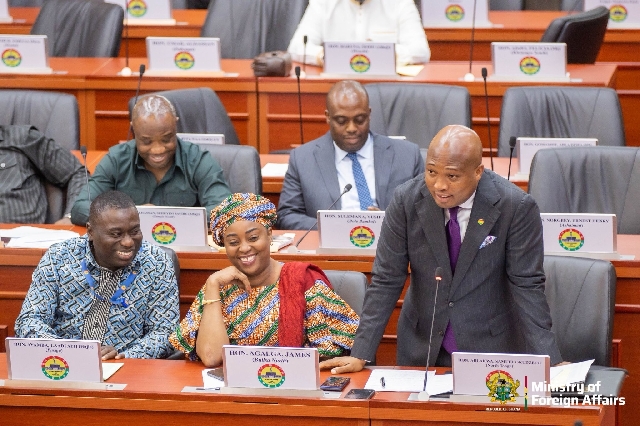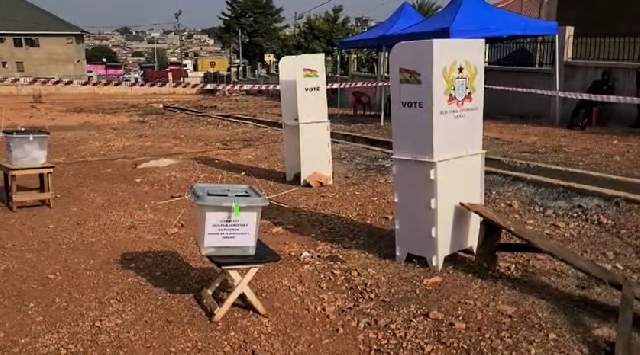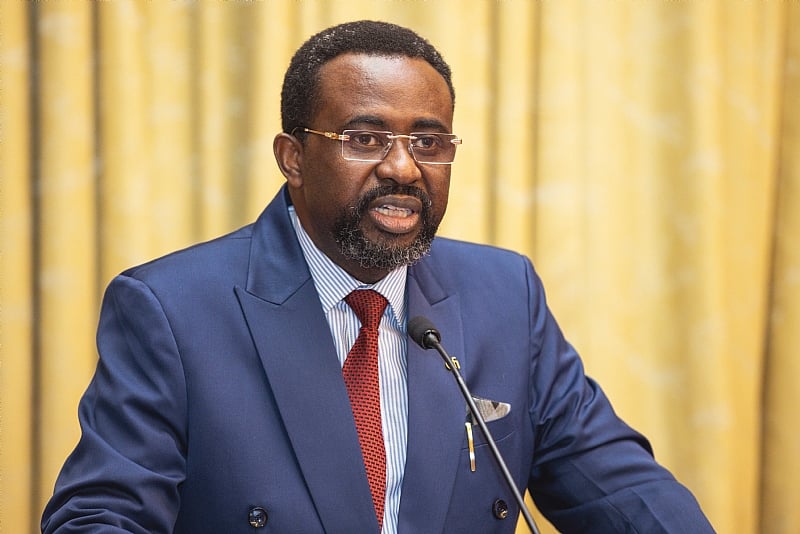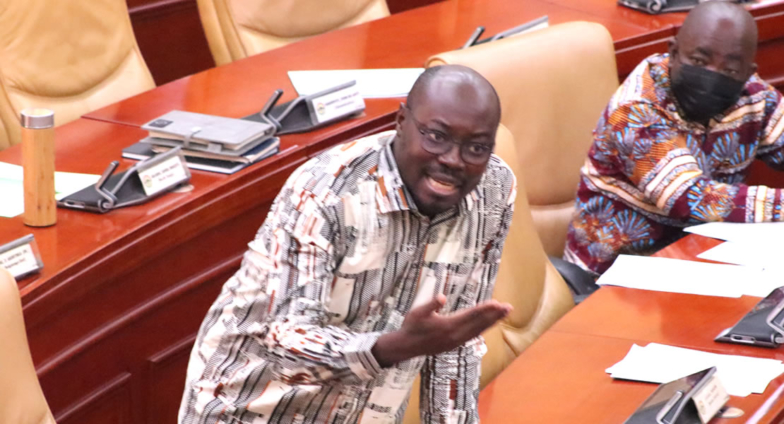Millar Institute Targets District Assemblies to Champion Grass Economy Innovation

Dr. Maxwell Ba-an Tengolzor, a lecturer at the Millar Institute for Transdisciplinary and Development Studies, is leading a project to transform the grass economy in Northern Ghana. Apexnewsgh reports With funding from the Food and Agriculture Organization (FAO), the project aims to turn 10 million tons of grass into productive resources, such as charcoal, briquettes, biochar, and paper. Dr. Ba-an explained that the project is training rural women in three regions – Upper East, Upper West, and Northern Region – to produce these resources and use biochar as a sustainable alternative to chemical fertilizers. The project has already conducted training sessions, conferences, and workshops in all three regions. The ultimate goal is to leverage the grass economy to influence social protection policies at the local government level, particularly in areas such as school feeding programs and poverty alleviation initiatives. To achieve this, Dr. Ba-an and his team have invited technical experts, social welfare directors, agriculture departments, forestry services, and other stakeholders to a national policy forum in Bolgatanga. Professor David Millar, President of the Millar Institute, addressed stakeholders at a forum, emphasizing the institute’s goal to revolutionize the North’s economy through innovation. He highlighted the district assembly as the primary target for this initiative, leveraging the region’s natural advantage as the “grass land” of Ghana. Meanwhile, addressing stakeholders at the forum, Professor Millar encouraged stakeholders to champion this innovation through the assembly, stressing the importance of educating donors about the initiative’s regional focus and potential national benefits. He explained that, although a national dialogue was initially planned, the institute opted to begin with district-level discussions to ensure grassroots engagement and ownership. By focusing on the district assemblies, the Millar Institute aims to empower local communities to drive economic growth and development, positioning the North as a model for sustainable innovation in Ghana. Source: Apexnewsgh.com Thanks for reading from Apexnewsgh as a news publishing website from Ghana. We encourage you to freely share this story via social media platform and follow us on; Facebook on APEXNEWSGH-Tv or Please contact Apexnewsgh.com on email apexnewsgh@gmail.com for your credible news publications. Contact: 0248250270/0256336062.
SWFA Trains Members on Innovative Grass Charcoal and Biochar Production

The Savannah Women Farmer Association (SWFA) has successfully trained its members on the production of grass charcoal and grass biochar, thanks to the expertise of the Millar Institute for Transdisciplinary Development Studies. Apexnewsgh reports SWFA Project Coordinator, Mr. Oseni Kabiru, shared the impact of this training during a regional stakeholder’s dialogue in Tamale on Monday. According to Mr. Kabiru, the training empowered members to harness the potential of nuisance grasses, preventing bushfires and the destruction of farmlands. By harvesting these grasses, members were able to produce charcoal for domestic use, reducing the need to cut down trees for fuel. Although the goal is to scale up production for commercial purposes, members are currently using the charcoal for personal consumption. The training also focused on using grass as organic manure to enhance agricultural productivity. By adopting this innovative approach, SWFA members are reducing their reliance on chemical fertilizers, promoting sustainable agriculture practices, and enriching their soil. Mr. Kabiru expressed pride in the progress made, stating that the initiative has not only eliminated the need for tree cutting but also empowered members to manage their natural resources effectively. The successful implementation of this project is a testament to the impact of collaborative efforts in promoting sustainable development and environmental conservation. Source: Apexnewsgh.com Thanks for reading from Apexnewsgh as a news publishing website from Ghana. We encourage you to freely share this story via social media platform and follow us on; Facebook on APEXNEWSGH-Tv or Please contact Apexnewsgh.com on email apexnewsgh@gmail.com for your credible news publications. Contact: 0248250270/0256336062
Innovative Biochar Production from Grasses: A Laudable Solution to Bushfires and Soil Fertility– Isaac Kofi Ntori

Mr. Isaac Kofi Ntori, a project officer with A-Rocha Ghana, has commended the innovative idea of producing biochar from grasses, describing it as “very laudable”. Apexnewsgh reports Speaking at a stakeholder’s dialogue meeting organized by the Millar Institute for Transdisciplinary and Development Studies in Tamale on Monday, July 8, 2024, Mr. Ntori highlighted the potential of grass biochar production to address two major challenges in the northern region of Ghana: bushfires and soil fertility. According to Mr. Ntori, grasses are a major cause of bushfires, which pose a significant threat to the landscape, agricultural farms, and properties. However, by harvesting these grasses and converting them into biochar, the soil structure and fertility can be enhanced, leading to increased productivity and reduced bushfires. He emphasized that this innovation has multiple benefits, including reduced carbon emissions, increased forest cover, and enhanced environmental and agricultural security. Mr. Ntori believes that this approach has great prospects, particularly in the agricultural sector, and encourages stakeholders to embrace this innovative solution. He believes, by converting grasses into biochar, Ghana can reduce the risk of bushfires, improve soil fertility, and promote sustainable agriculture practices. This laudable innovation he said has the potential to transform the agricultural landscape in Ghana and ensure a more secure and sustainable future. Source: Apexnewsgh.com Thanks for reading from Apexnewsgh as a news publishing website from Ghana. We encourage you to freely share this story via social media platform and follow us on; Facebook on APEXNEWSGH-Tv or Please contact Apexnewsgh.com on email apexnewsgh@gmail.com for your credible news publications. Contact: 0248250270/0256336062
Grass Biochar: The Sustainable Solution to Soil Degradation and Food Insecurity–Bilal Taimako

Mr. Bilal Taimako Shamsudeen , a representative from the Edugha Institute for Social Development (EISD) and founder of Taimako Plants and Herbal Centre, has emphasized the importance of adopting grass biochar as a sustainable solution to reclaim lost nutrients in soil and promote food security. Apexnewsgh reports Speaking at a stakeholder’s dialogue meeting organized by the Millar Institute for Transdisciplinary and Development Studies in Tamale on Monday, July 8, 2024, Mr. Taimako stressed that chemical fertilizers have destroyed lands and the environment, and that grass biochar is the way forward. He expressed his excitement about the conversation around biochar, stating that it is a necessary step to save the environment and ensure food security. According to him, grass biochar solves several environmental issues, including pollution, bush burning, and soil degradation, while also providing employment opportunities, especially for women. Mr. Taimako emphasized that the impact of biochar on food security, health, and education is enormous, and that it is essential to move beyond talk and into action. He encouraged stakeholders to embrace biochar as a better alternative to inorganic fertilizers, which have negative impacts on soil and the environment. “We don’t have a choice; we need to adopt biochar to save our environment and ensure food security,” he emphasized. “Let’s get to work and make a positive impact on our soil, food, and communities.” The meeting aimed to bring together stakeholders to discuss alternative approaches to sustainable agriculture and environmental conservation. Mr. Taimako’s call to action on grass biochar adoption is a significant step towards promoting sustainable practices and ensuring a food-secure future. Source: Apexnewsgh.com Thanks for reading from Apexnewsgh as a news publishing website from Ghana. We encourage you to freely share this story via social media platform and follow us on; Facebook on APEXNEWSGH-Tv or Please contact Apexnewsgh.com on email apexnewsgh@gmail.com for your credible news publications. Contact: 0248250270/0256336062
Prof. Felix Y. T. Longi Advocates for Grass Biochar Adoption in Ghana

Associate Professor Felix Y. T. Longi, a social historian at the University of Development Studies, has thrown his weight behind the promotion of grass biochar as a sustainable alternative to traditional charcoal. Apexnewsgh reports Speaking at a regional stakeholders’ dialogue organized by the Millar Institute for Transdisciplinary and Development Studies on Monday, July 8, 2024 in Tamale , Prof. Longi emphasized the enormous benefits of grass biochar, including environmental protection, climate change mitigation, and improved agricultural production. He envisioned a future where a consortium of like-minded individuals would come together to organize a national or international conference to share research findings and best practices on grass biochar. By adopting grass biochar, Ghana can reduce its reliance on fuel wood and chemical fertilizers, which have harmful environmental and health impacts. Prof. Longi also pointed the importance of decolonizing knowledge production and promoting indigenous knowledge systems. He believes that by embracing grass biochar and organic manure, Ghana can break free from the shackles of colonialism and develop a more sustainable and self-sufficient agricultural sector. The historian emphasized that the time has come for Ghana to take steps towards self-reliance and environmental sustainability, citing examples of other countries that have successfully made the transition. He urged stakeholders to support the grass biochar initiative, which he believes has the potential to transform Ghana’s agricultural landscape. Source: Apexnewsgh.com Thanks for reading from Apexnewsgh as a news publishing website from Ghana. We encourage you to freely share this story via social media platform and follow us on; Facebook on APEXNEWSGH-Tv or Please contact Apexnewsgh.com on email apexnewsgh@gmail.com for your credible news publications. Contact: 0248250270/0256336062
GhaFFaP President Advocates for Sustainable Practices and Grass Biochar Application
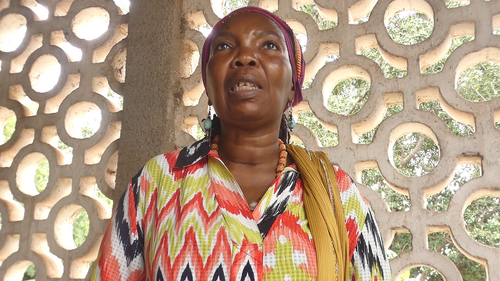
The National President of the Ghana Federation of Forest and Farm Producers (GhaFFaP) and a leader for Savannah Women Farmer Association (SWFA), Madam Alima Sagito Saeed, has stressed the need for sustainable practices and the application of grass biochar to improve soil fertility and promote environmentally conscious farming methods. Apexnewsgh reports Speaking at a stakeholders’ dialogue in Tamale, Madam Alima highlighted the federation’s goal of ensuring its members achieve the best possible outcomes from their investments in land and farming practices. She noted that soil fertility has become a significant issue affecting farmers but emphasized that alternatives like grass biochar can provide opportunities for improvement. The GhaFFaP president further emphasized the importance of adopting environmentally conscious practices to ensure sustainability and highlighted the federation’s efforts to restore sustainable practices and promote knowledge management over the past four years. According to Madam Alima, the federation has collaborated with the Millar Institute for Transdisciplinary and Development Studies, a research and knowledge management institution, to produce sustainable products and promote sustainability awareness. The stakeholders’ dialogue brought together state institutions, community development organizations, and partners to discuss alternative approaches to restoring forests, lands, and livelihoods. Madam Alima stressed the importance of adding value to grassroots initiatives and promoting sustainable practices to ensure a sustainable future for farming communities. She believes, the application of grass biochar, as introduced by the Millar Institute, is seen as a key solution to improving soil fertility and promoting sustainable farming practices. “By adopting this approach, farmers can improve their yields, reduce environmental degradation, and contribute to sustainable agriculture practices in Ghana”. She stressed Source: Apexnewsgh.com Thanks for reading from Apexnewsgh as a news publishing website from Ghana. We encourage you to freely share this story via social media platform and follow us on; Facebook on APEXNEWSGH-Tv or Please contact Apexnewsgh.com on email apexnewsgh@gmail.com for your credible news publications. Contact: 0248250270/0256336062
Locally Sourced Grass Biochar Offers Sustainable Solution for Soil Fertility–Prof. David Millar
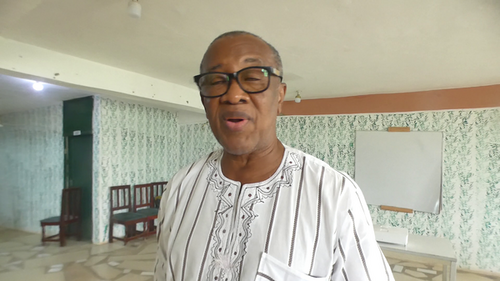
Professor Millar, President of the Millar Institute for Transdisciplinary and Development Studies (MITDS), has highlighted the significance of grass biochar in improving soil fertility, particularly in rural areas. Apexnewsgh reports Speaking at a regional workshop in Bolgatanga, Prof. Millar emphasized that the resources required for biochar production are readily available at the local level, unlike chemical fertilizers. The MITDS, in collaboration with Ghana Federation of Forest and Farm (GhaFFap)/ Forest and Farm Facilities(FFF) is implementing three major projects: grass paper production, charcoal production, and tree planting for reforestation and water conservation. While paper production requires industrial-scale investment, charcoal and biochar production can be done at the community level, empowering farmers to take ownership of their soil fertility. Prof. Millar stressed that a ten-year funding commitment for these projects could lead to a significant environmental impact in the northern region of the country. By charring grass, farmers can create natural fertilizer, reducing the need for chemical fertilizers and the risk of bush fires. This approach also promotes natural regeneration and carbon sequestration, with calculated benefits. Cost-benefit analyses have shown that using biochar is more economical than chemical fertilizers, and the resources required are readily available to farmers at little to no cost. This sustainable solution has the potential to improve livelihoods and mitigate environmental degradation and climate change. Source: Apexnewsgh.com Thanks for reading from Apexnewsgh as a news publishing website from Ghana. We encourage you to freely share this story via social media platform and follow us on; Facebook on APEXNEWSGH-Tv or Please contact Apexnewsgh.com on email apexnewsgh@gmail.com for your credible news publications. Contact: 0248250270/0256336062.
Grass Biochar: Community Resource Management Executive Secretary Lauds Prof. Miller’s Biochar Innovation
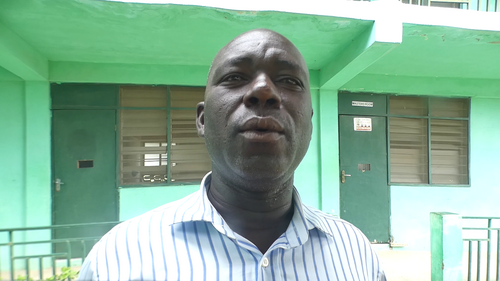
Mr. Pwamebam Frank, Executive Secretary of Community Resource Management, has praised Prof. Miller’s biochar innovation, hailing it as a game-changer for the region. Apexnewsgh reports Speaking at a regional stakeholder workshop organized by the Millar Institute in Bolgatanga, Upper East regional capital, Mr. Frank noted that the innovation will significantly reduce the costs of chemical fertilizers, leading to improved health and economic benefits for the community. Economic and Environmental Benefits Mr. Frank highlighted the numerous benefits of biochar, including reduced chemical consumption, improved health, and increased food sovereignty. He also noted that the innovation will help protect the environment by reducing deforestation and pollution in water bodies. Empowering Communities Mr. Frank encouraged the adoption of biochar, citing its potential to improve education and livelihoods. He emphasized that the innovation is demand-driven and can be easily adopted by farmers, leading to increased yields and reduced costs. Call to Action Mr. Frank urged the Institute and Prof. David Millar to continue researching and promoting biochar, exploring its diverse uses, including biochar powder for tea and other products. He expressed his gratitude for the innovation and its potential to bring economic benefits to individuals and the community. In summary, Mr. Pwamebam Frank has lauded Prof. Millar’s biochar innovation as a revolutionary solution for sustainable agriculture, economic growth, and environmental protection in the Upper East region and beyond. Source: Apexnewsgh.com Thanks for reading from Apexnewsgh as a news publishing website from Ghana. We encourage you to freely share this story via social media platform and follow us on; Facebook on APEXNEWSGH-Tv or Please contact Apexnewsgh.com on email apexnewsgh@gmail.com for your credible news publications. Contact: 0248250270/0256336062.
Grass Charcoal: Millar Institute for Transdisciplinary and Development Studies organizes a dialogue conference….

Millar Institute for Transdisciplinary and Development Studies a well-known research institution operating in the Upper East Region has organized a dialogue conference that brought together a working group of renewable energy practitioners and policy actors to share information and make inputs into the ongoing organic briquettes production policy alternatives to regulate wood fuels in Ghana. The dialogue conference saw partners actively participate by asking interesting questions on the way forward, especially with the new grass-to-charcoal innovation which has come as a remedy to eliminate bushfire burning and even felling of resourceful trees such as shea nuts trees for the production of wood charcoal in the northern part of Ghana. Meanwhile, addressing participants at the dialogue conference on Friday, November 25, 2022, at the Nana Addo Dankwa Akufo-Addo Conference Hall, Millar Institute for Transdisciplinary and Development Student (MITDS) Prof. David Millar, the originator of the grass charcoal and grass brown paper innovation said, at this level, they are two major areas and one is to have a business offtake to a business enterprise, a business man or business entrepreneur who would pick it and upscale it and aside that, the impact will be bigger than what we have done so far. So, that business component is yet to come on board”. “The second one is the policy because there has to be some policy alternative to support this initiative”. Prof. Millar has done an extensive study on the use of organic material to make breakers and it has come out clear that the experiences internationally in Africa and in West Africa so far have been on assorted farm buy products, not on grasses. We couldn’t find a single experience on the use of grass in making breakers within the subregion and not in Africa. So that’s something very unique and we think that if we want to upscale its uniqueness we need the policy support for that. Prof. Millar stressed However, the Forest and Farm Producer Organizations (FFPO’s) trained by the Millar Institute on Organic briquettes production technology also participated in the dialogue conference as they share their experiences and lessons learned. Source: Apexnewsgh.com/Ngamegbulam Chidozie Stepehen/Ghana For publication please kindly contact us on 0256336062 or Email apexnewsgh@gmail.com
A Professor should at least profess some local innovation in their local communities—Prof. Millar

President of the Millar Institute for Transdisciplinary and Development Studies Professor David Millar is advocating for those with the title ‘Professor’ to redirect their effort by way of professing some local innovation in their local communities. Speaking in an exclusive interview with Apexnewsgh.com, Prof. Millar said, that is the only way the community people will recognize those rooming and calling themselves Professors in Africa. “Academia in Africa as a whole especially the Professors should redirect their effort by way of professing local innovation in our local communities. Once you start professing that, your people will appreciate the school you have gone to. For now, they don’t know you are a professor, they only know you have gone to school and you have come to solve this problem for them”. Meanwhile, Pro. Millar through his innovation in Ghana has started changing the narrative, especially for the people in the rural communities in the northern part of Ghana by way of using what is mostly described as nuisance grass to produce charcoal and brown paper. The grass initiative alone is expected to create jobs for the community people and as well reduced bush fires which in the past have affected some innocent farmers after losing their hard earn effort throughout the farming season. However, another interesting part of the grass innovation by Prof. Millar proves that the grass conversion into brown paper will massively address the issue of plastic and environmental pollution in Ghana. Apexnewsgh.com/Ghana/Ngamegbulam Chidozie Stephen Please contact Apexnewsgh.com on email apexnewsgh@gmail.com for your credible news publications. Contact: 05555568093

